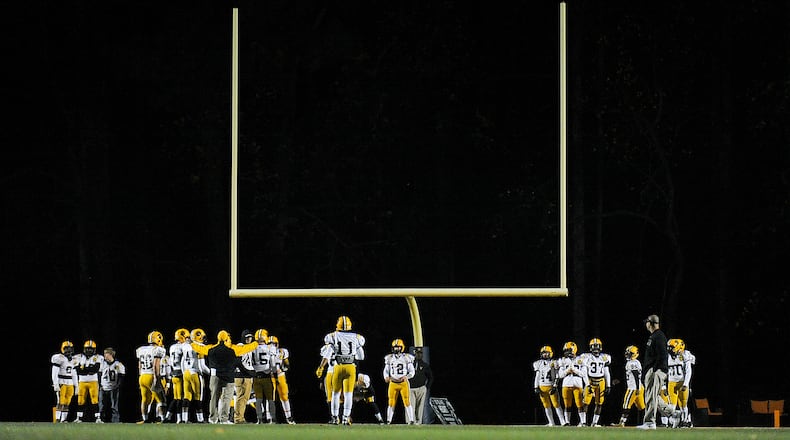Each week, five high school coaches will discuss one issue that affects Georgia high school sports. | Last week: Home-schooled athletes
It really comes down to how good you are.
Jeff Francoeur didn’t need to concentrate on one high school sport because he was arguably one the top of multi-sports athletes the state has produced. Football scholarship from Clemson, then selected No. 23 by the Braves in the 2002 baseball draft.
Georgia Tech football’s all-time leading scorer Harrison Butker, who just won a Super Bowl ring with the Kansas City Chiefs, played soccer, basketball and kicked for the football team at Westminster. He said he didn’t need to specialize — one sport helped the other.
But other athletes across the state who need to concentrate on one sport in an effort to obtain major-college scholarships, are specializing. In many cases, the sport is picked in junior high, and the high school years are devoted to mastering that sport. As a result, the multi-sport athlete isn’t dying in Georgia, but the numbers are declining.
Are there benefits for both? Yes. The multi-sport athlete faces less of a chance of burnout from focusing on one sport all year. The specialized athlete learns discipline.
So there’s your issue. What’s the best route — specialization in one sport or being the best you can be in two sports? Or three?
The skinny: Rush Propst, who recently took the Valdosta head coaching job, might surprise you with his thoughts on specialization in high school sports.
“I believe in the multi-sport athlete,” he said. “I always thought that the best athletes are those who can play multiple sports.”
Propst was an all-county wide receiver and defensive back for Alabama’s Ohatchee High School and also started for two years on the basketball team. As a coach in Georgia, Propst led Colquitt County to state championships in 2014 and 2015 in back-to-back perfect seasons.
Propst believes there is a time when a high school athlete should specialize. The key? Not too early.
Propst: "I don't ever agree that a kid should specialize in the fifth, sixth, seventh, eighth, ninth and 10th grades. But after the 10th grade, that's when decisions have to be made. I tell kids, 'Give it to the 10th grade and then if you just dislike one sport but love the other one and you want to spend all of your time there, I can't tell you not to do it. But give yourself a chance because sometimes you don't know that decision until at least your 10th-grade year.'
“... All through my first three stops as an assistant and a head football coach, we had to share athletes. And to be quite honest, I thought those were our best athletes, the athletes who played multiple sports. When I moved to a bigger school, I just found that a multi-sport athlete -- I'm not saying all the time -- usually performs better in pressure situations.
“I want a guy, whether it’s at receiver or corner or quarterback or running back, if it’s a third-down or a fourth-down desperation play ... if that same guy has been in the batter’s box with runners on second and third with two outs and they are down a run and a base hit wins the game in the seventh … I want that guy. To me, all that goes hand-in-hand because of the mental edge you get by staying focused as an athlete year-round. That is what I've noticed. Sometimes the one-sport athletes put too much pressure on themselves because they have had all year to think about that pressure situation. A dual-sport athlete has been able to be in more pressure situations. So I’ve just always believed that guy is the one I think he handles pressure more.”
AT ISSUE: Multi-sport athletes vs. specialization
• Jeff Francoeur, former Parkview multi-sport star
• Harrison Butker, former Westminster multi-sport star
• Tim McFarlin, Blesses Trinity coach
• Rush Propst, Valdosta coach
• Tim Hardy, Greater Atlanta Christian coach
» MORE: Previous topics
About the Author
The Latest
Featured

